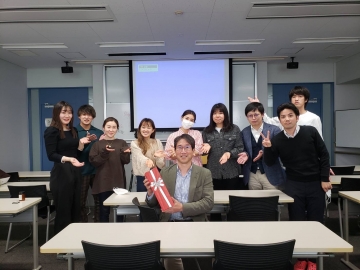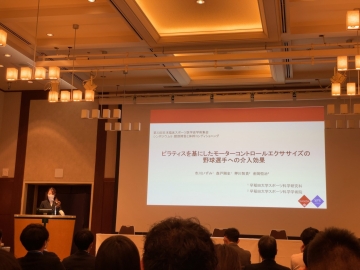“Through Pilates, I want to reduce the number of athletes suffering from injuries as much as possible.”
Izumi Ichikawa, 2nd year in the Master’s Program of the Graduate School of Sport Sciences
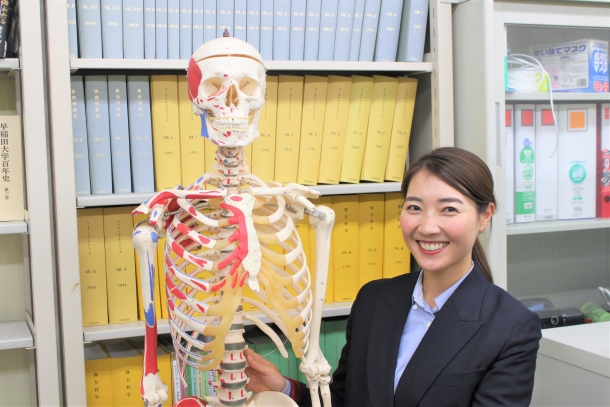
At the Kaneoka Laboratory to which Ichikawa-san belongs
After joining Yamaguchi Asahi Broadcasting in 2010, Izumi Ichikawa has been active as an announcer and currently works as a freelance announcer, mainly covering high school baseball and professional baseball. Ichikawa is a qualified Pilates instructor and is researching the prevention of injury among baseball players through Pilates at the Graduate School of Sport Sciences. We asked Ichikawa, who has three titles: freelance announcer, Pilates instructor, and graduate student, about why she decided to enroll in graduate school and what motivates her to continue learning.
――Please tell us what made you enter the Graduate School of Sport Sciences at Waseda University.

As a freelance announcer, Ichikawa-san also covers players selected at draft meetings. In 2018, she interviewed Akira Neo (Chunichi Dragons) and Kyota Fujiwara (Chiba Lotte Marines), who were nominated by Osaka Toin Senior High School and are currently active in professional baseball.
The reason I went on to higher education was that I had seen many players suffering from injuries while covering high school baseball and professional baseball as an announcer over 12 years.
In particular, I was impressed when meeting one player who is a student at a school regularly playing at the Koshien. The player, who was blessed with a good physique and was expected to play well after entering university, said, “My shoulder is battered due to injury, and I can’t continue playing baseball in university.” I myself was frustrated by the current situation in which he and many other players have had their sports lives cut short owing to injury.
Around the same time, I also suffered from lower back pain… As part of my treatment, I started doing Pilates. It just so happens that many athletes attended that class, and I learned that Pilates is effective not only in treating back pain but also in preventing injuries and training for athletes.
When I tried to recommend the Pilates that I had learned in the class to a Hanshin Tigers player during an interview, his response was, “What’s that? It sounds like dessert”. At the time, I had no academic knowledge of Pilates, so I couldn’t convince him… I strongly felt that I can’t let things stay this way! I decided to go to graduate school because I wanted to study Pilates and baseball players’ disabilities, so that I can help athletes suffering from injuries as much as possible.
――What are you studying in graduate school?
In graduate school, I am researching disabilities and prevention of baseball players in the laboratory of Koji Kaneoka (Professor, Faculty of Sport Sciences). Currently, I am writing a master’s thesis on the effects of Pilates-based motor control* exercise intervention on pelvic tilt mobility and lumbar disorders in university baseball players.”
* Ability to adjust various structures necessary for exercise.
As part of the research, I asked players from the Waseda University Baseball Club to be test subjects. I asked 12 athletes with back pain to engage in motor control exercises centered on Pilates for about three months and measured how much the exercise relieved their back pain. In addition to a questionnaire survey, I also measured changes in pelvic tilt mobility back and forth, which is cited as a trigger for low back pain. For measurement, I used a three-dimensional motion analysis device. The effectiveness of motor control exercises was verified by attaching reflective markers to various joint of the body, surrounding the subjects with eight cameras, and measuring the range of motion of each joint.
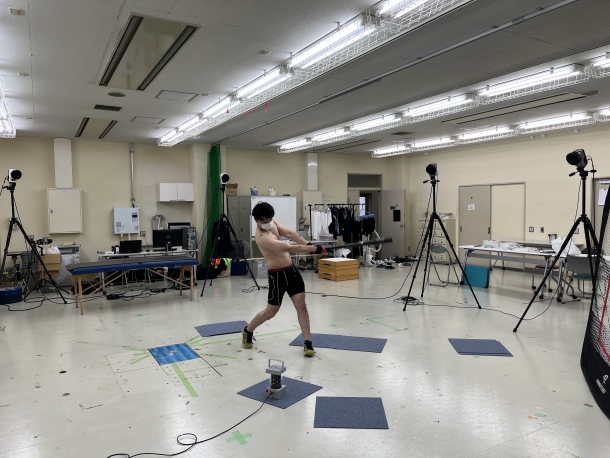
The experiment was conducted with the cooperation of the Waseda University Baseball Club. The range of motion of each joint was measured with actual striking form. It took about three hours for each measurement, so Ichikawa says she can’t thank the baseball club players enough.
The findings before and after the experiment showed that the back pain was almost eliminated by exercise, while the range of motion was wider in many parts of the body than before the experiment. Through this research, it was possible to confirm that Pilates may have an effect on back pain.
Left: In April 2022, members of the laboratory celebrated Prof. Kaneoka’s 60th birthday (Ichikawa in the center of the back row)
Right: In November 2022, she spoke at the symposium of the 33rd Annual Meeting of the Japanese Society of Clinical Sports Medicine on the theme of her master’s thesis. Ichikawa-san, who is accustomed to speaking in front of people as an announcer, was very nervous.
――Please tell us a little more about Pilates, your research theme, and your activities as a Pilates instructor.
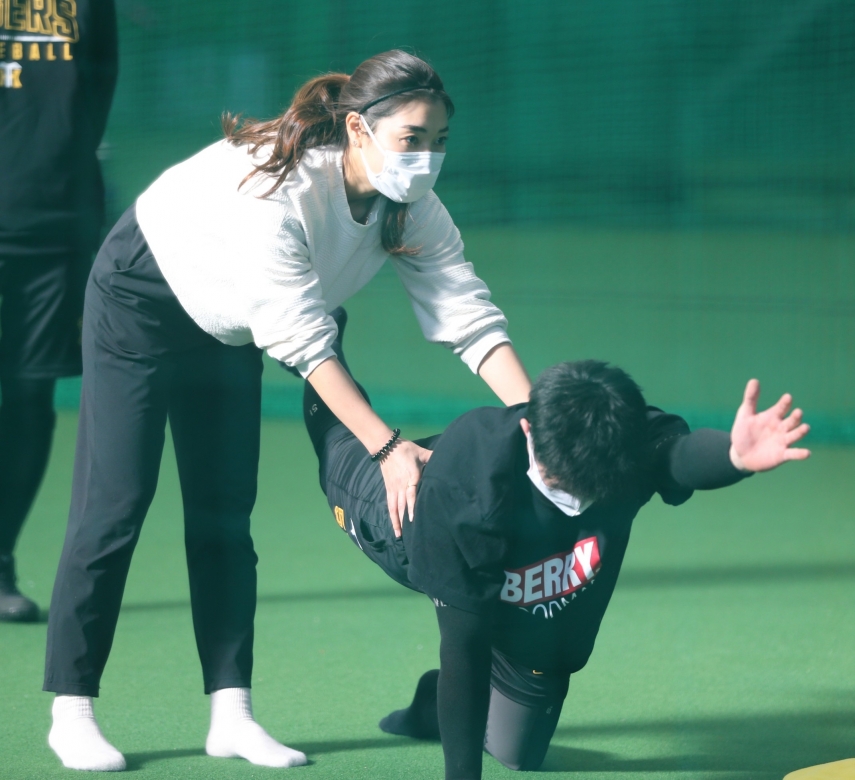
This photo was taken when Ichikawa-san coached Pilates at the Hanshin Tigers farm team spring camp. In the Pilates lessons, they stretch their hamstrings to improve athletic performance.
Pilates is an exercise devised by Joseph Pilates during World War I for the rehabilitation of wounded soldiers. I am currently a certified Pilates instructor and regularly train professional baseball players as well as visit my high school baseball team for regular Pilates lessons. In February 2022, I coached Pilates at the Hanshin Tigers’ farm team spring camp.
Since Pilates trains the core considerably, many people say that it is “harder than I imagined.” When organizing the training, I observe each player’s throwing form in advance, listen to their concerns, and try to incorporate exercises that can eliminate causes of injury.
Many pitchers, in particular, have a delicate sensitivity to changes in their bodies, so they immediately feel the effects. I have received many positive comments, such as “When I went into the bullpen the day after doing Pilates, my pelvis moved more than usual and it was easier to throw.”
――What motivated you to aim high while building your career as an announcer and going on to graduate school?
I’ve had a lot of fun in my life thanks to baseball. My biggest motivation is to do something useful in the baseball world. Looking back now, it was a pretty drastic decision to give up the job I had at hand, pay my own tuition, and go to graduate school. But you only live once. When I felt that I wanted to do it, I thought that I would regret it later if I didn’t act immediately.
In balancing things with work, I set priorities for the day and try not to put them off until later. I always get up at 6 a.m. every morning and think while walking, and input information while listening to YouTube. After that, I have a routine of eating breakfast and finishing high-priority tasks in the morning. Finishing tasks in the morning helps me spend the day feeling refreshed, so I recommend it to everyone.
ご縁あって、初めて医学雑誌に寄稿致しました🙇♀️
金岡恒治教授、研究室の先輩方に助けていただきながらなんとか書けました。
ありがとうございます😭野球選手の障害予防の一助になればと思いますので、よろしければ手にとってください☺️ pic.twitter.com/NGEOUC2gW0
— 市川いずみ(年125冊以上読むフリーアナウンサー&pilates instructor &大学院生) (@ichy_izumiru) September 24, 2022
She submitted her graduate research as a contribution to a medical journal
――Your Twitter profile says that you are an announcer who reads more than 125 books a year, can you tell us more about this?
Shortly after I retired from my job as a station announcer and became a freelance announcer, I had no confidence at all. It’s a tough world in which freelance announcers have to find their own jobs. As I was under pressure and had a lot of uncertainty for a long time, former Hanshin Tigers coach Akihiro Yano, whom I had been interviewing quite regularly, pointed out my lack of confidence, saying, “It is very difficult to be in the top 1% of everything, but only 1% of Japanese adults read more than 100 books a year. As a reader, you would be able to achieve something that only one in 100 people can do, and you would gain confidence.”
I have loved reading since I was a child. I started reading with the goal of reading more than 100 books a year, and the following year, I read 125 books. Not only did I achieve the top 1% and gained confidence, but through reading, I learned about how various people think and live, which changed the way I approach human relationships and work, thus changing my life.
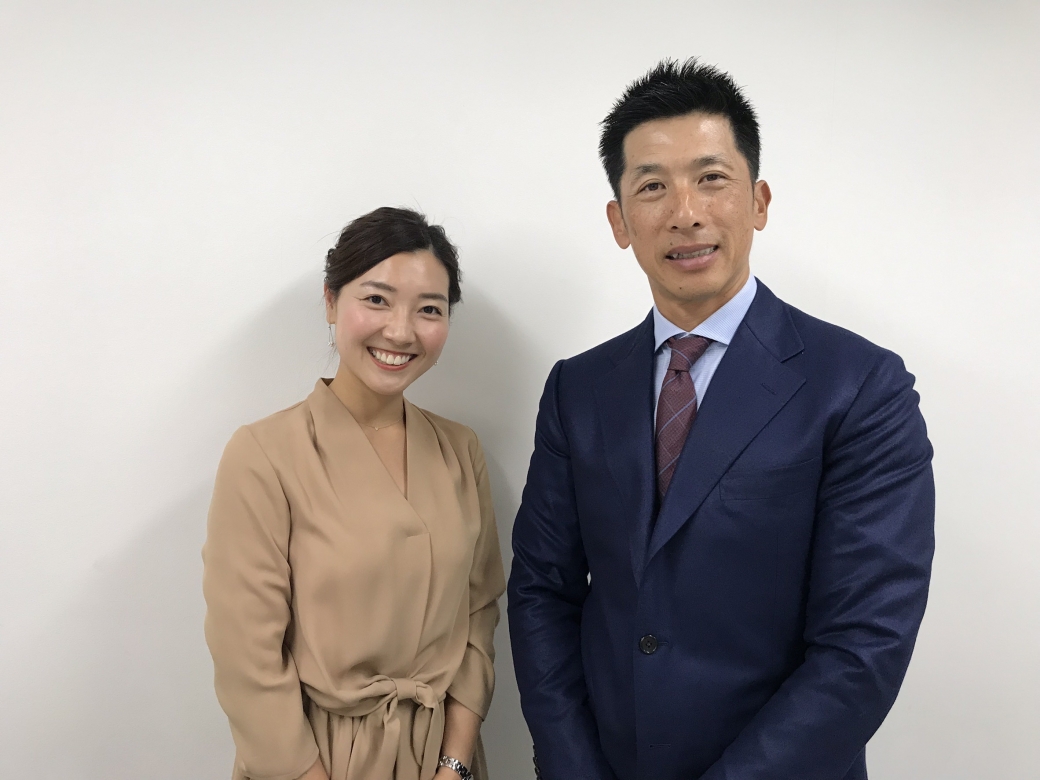
In November 2018, when she was the MC at a talk show with Akihiro Yano (coach of the Hanshin Tigers farm team at the time).
――Finally, please tell us about your future goals.
After graduating from graduate school, I would like to give back what I have learned to baseball in practice. I myself have covered baseball as an announcer and studied athletes’ disabilities in graduate school. I want to do what I can because of who I am. I would also like to hold seminars for coaches and other people involved in baseball. I would like to contribute to reducing the number of players suffering from injuries as much as possible.
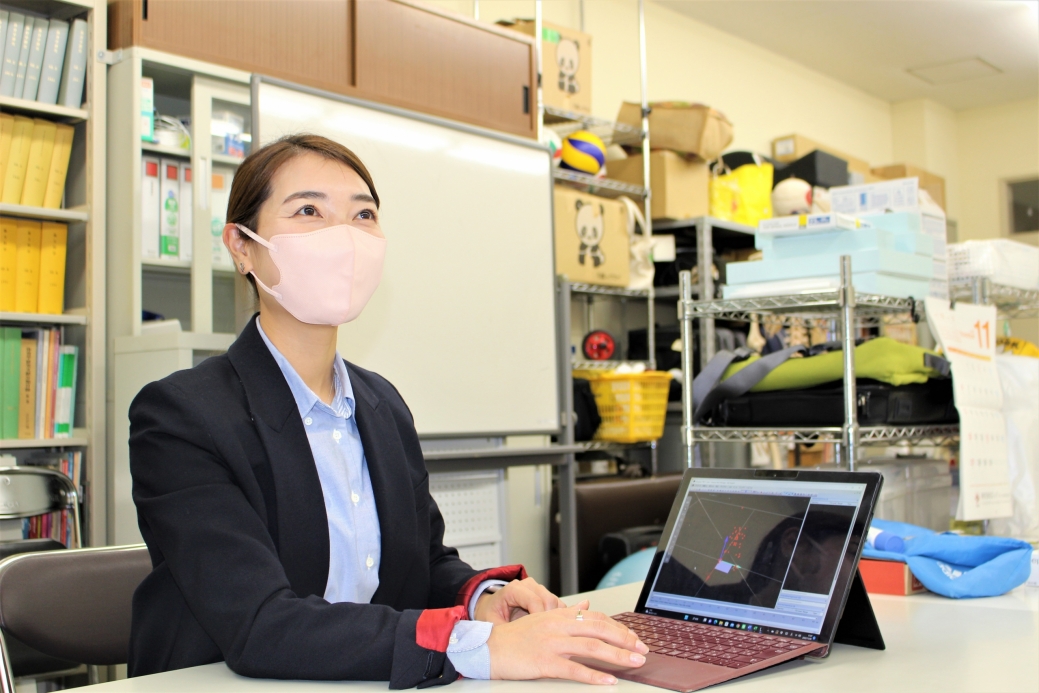
Ichikawa-san shows the software of the 3D motion analysis device used in the experiments and explains the contents of her thesis.
The 834th
Interview, text, photography: Waseda Weekly reporters (SJC Student Staff)
Takumi Hasegawa, 4th year at the School of Education
[Profile]
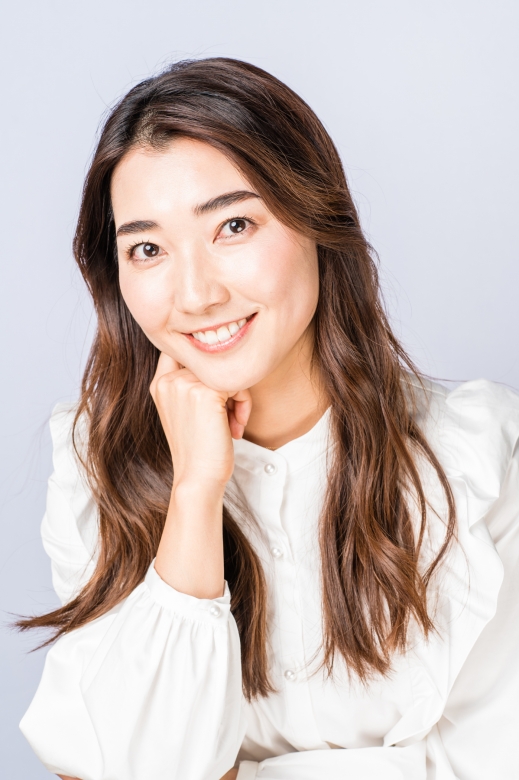
Ichikawa-san was born in Kyoto. She graduated from Kansai University Faculty of Law. She is a PHI Pilates instructor. After joining Yamaguchi Asahi Broadcasting in 2010, she worked as an announcer for five years, doing baseball commentary and J.League coverage before becoming a freelance announcer. Currently, she belongs to Office Keyword. One book recommended by the avid reader Ichikawa-san is Driver: A Messenger from the Past that Changes the Future (Discover 21) by Yasushi Kitagawa. The book changed her life, and she hopes other university students will read it.
Twitter: @ichy_izumiru
Instagram: @izumichikawa
*This article is a translation from the Japanese edition of Waseda Weekly published on December 13, 2022. The content is current at the time of Japanese publication.

